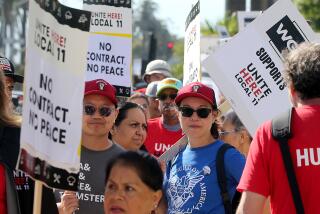Beverly Hills voters to decide the fate of ultra-luxury LVMH hotel project
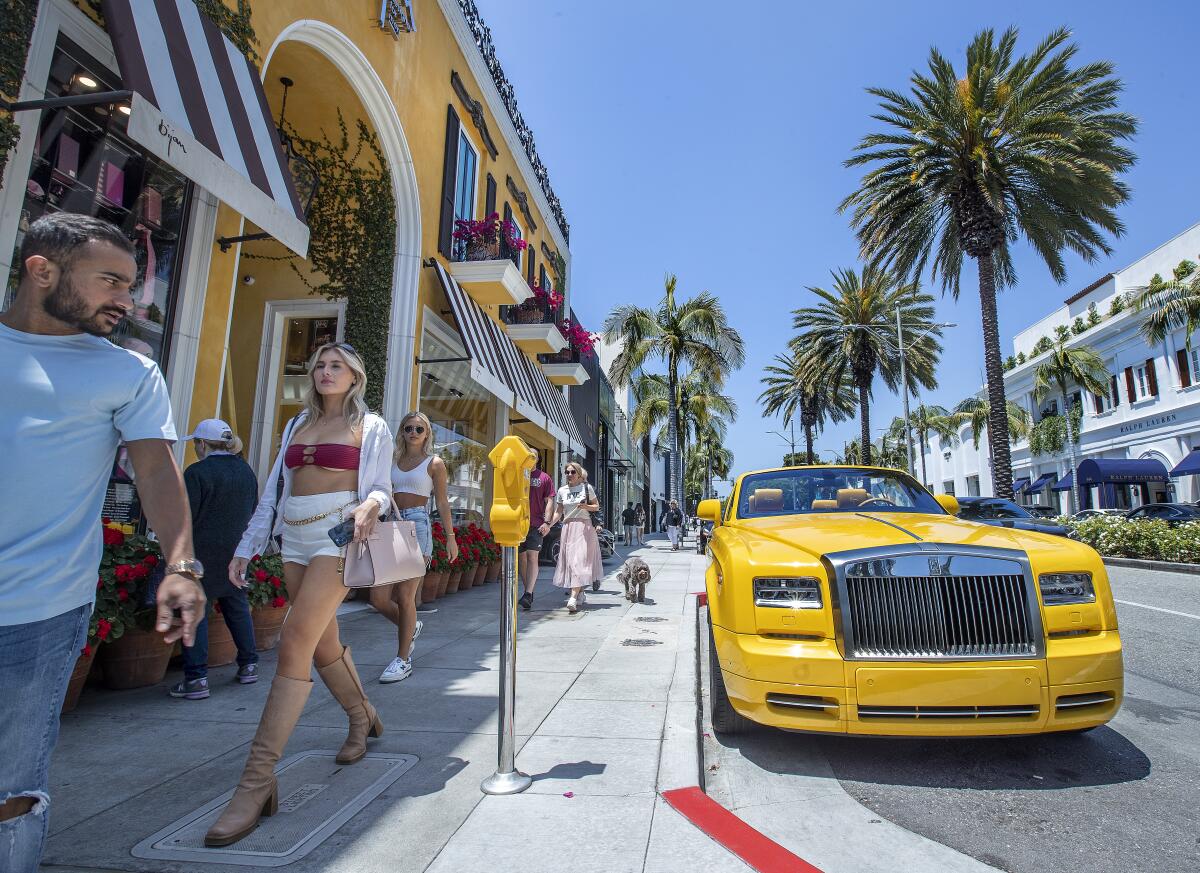
In a city whose name is shorthand for exclusivity and wealth, the future of a planned ultra-opulent hotel will soon be decided by the most democratic of means: an election.
Beverly Hills voters will decide Tuesday whether to rescind the City Council’s approval of a hotel project helmed by French multibillionaire Bernard Arnault and LVMH Moet Hennessy Louis Vuitton, his luxury conglomerate.
To some, the battle over the Beverly Hills Cheval Blanc hotel is a David and Goliath story, pitting a small group of residents concerned about overdevelopment and a union advocating for affordable housing against the world’s richest person.
Others see it as a tale of an outside group — in this case Unite Here Local 11 — mucking around in the city’s business and potentially depriving Beverly Hills of hundreds of millions of dollars in tax revenue over the next three decades. The politically powerful union, which represents hospitality workers across the region, collected the local signatures necessary to force the issue to a vote.
Regardless, all parties seem to agree that the result will have lasting implications for a 5.7-square-mile city where roughly 31,000 residents bed down at night and many more people staff homes, offices, stores, restaurants and hotels during the day.
Beverly Hills already has 16 hotels, seven of which are considered luxury, according to the city. But the Cheval Blanc would aim to be the brightest star in a galaxy of sparkle, promising an exceptionally high-end experience for its wealthy clientele.
The Cheval Blanc Beverly Hills is intended to be a notch above the already high-end market.
It would be the first North American property for LVMH’s relatively new chain, which currently has five hotels, including a ski-in and ski-out chalet in the French Alps and a St. Barts hotel where the entire property is lightly scented with a custom Guerlain fragrance.
“I think it’s fair to say that this is the only city in the world that could have made this deal,” Henry Finkelstein, the outside lawyer who represented Beverly Hills in the development negotiations, said during a November City Council meeting. “If you look at virtually any other place, including in the metro Los Angeles area in particular, they would be paying subsidies. And here we are exacting premiums.”
The Beverly Hills Cheval Blanc, which was approved by the City Council and the City Planning Commission last year after a lengthy public process, would also reshape the edge of one of the most famous retail strips in the world.
When most people think of Rodeo Drive, they tend to focus on a specific portion of the roughly two-mile street: a three-block business district that doubles as an international symbol of luxury retail, where the streets are lined with palm trees and vast sums of capital.
The hotel — replete with a members-only club, restaurants, retail and a spa — would rise at the northernmost of those three blocks, abutting Little Santa Monica Boulevard.
After raising numerous objections during the planning process, Unite Here Local 11 began gathering signatures to challenge the project shortly after the development agreement and zoning amendment were approved in November.
Triggering a referendum election in Beverly Hills requires the signatures of 10% of registered voters, meaning that just 2,193 signatures were necessary at the time.
Representatives of the union argue that cities like Beverly Hills often change development rules to make it easier to build commercial luxury projects, but don’t always do this for housing. They also vociferously object to the fact that the development agreement does not specifically earmark any money for affordable housing.
Unite Here Local 11 carries tremendous political heft nine miles east, at Los Angeles City Hall, where it has pushed legislation and where one of its own, former organizer Hugo Soto-Martínez, now sits on the City Council. The union local also has been instrumental in recent policies in West Hollywood, but its influence is relatively nascent at Beverly Hills City Hall.
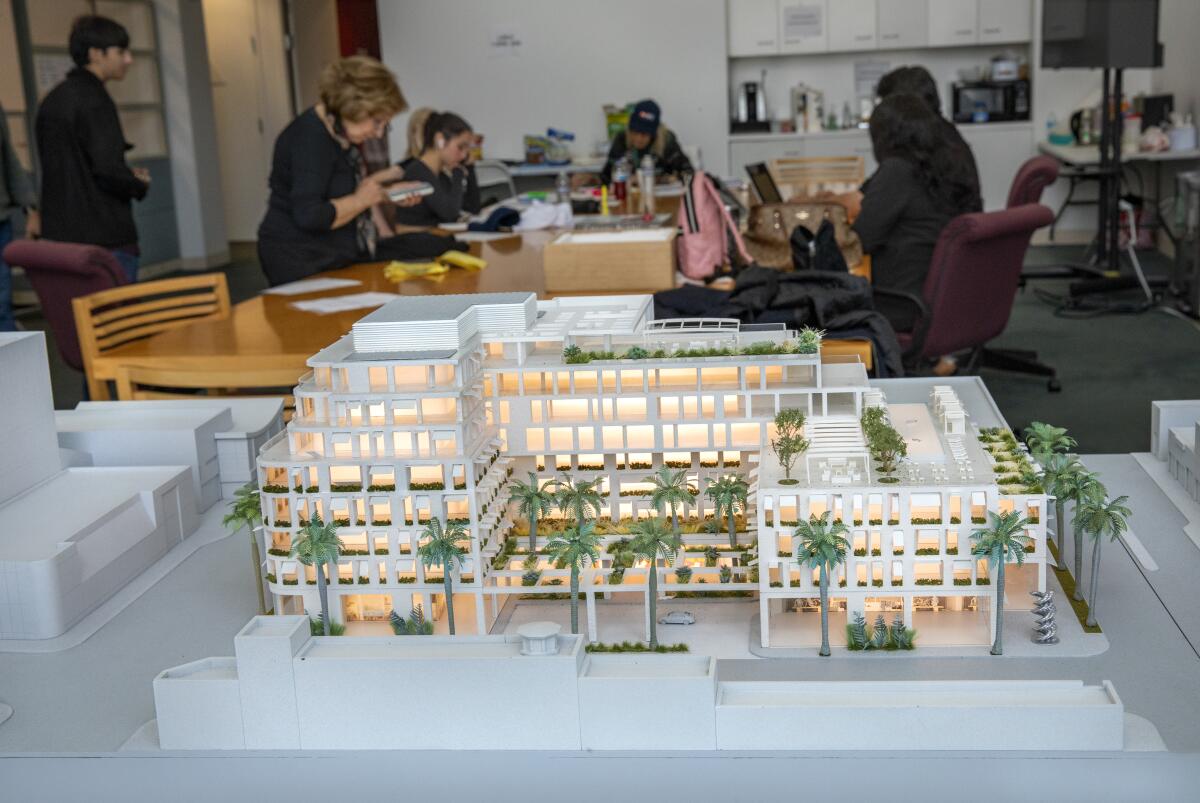
The city’s development agreement with LVMH dictates that the company contribute $26 million to the city’s general fund, in addition to $2 million for art and cultural programs. The city would also receive an additional 5% surcharge over its regular 14% transient occupancy tax.
The proposed hotel complex, designed by star architect Peter Marino, would replace a number of buildings, including the Richard Meier-designed site formerly occupied by the Paley Center for Media on North Beverly Drive around the corner from Rodeo. The hotel would vary from four stories to a partial ninth-story penthouse, taller than current zoning rules allow, according to the final environmental impact report.
According to the city’s analysis, the hotel is expected to funnel about $725 million into city coffers over the next 30 years, with the bulk of that coming from the combined 19% bed tax.
It’s money that Councilmember Lili Bosse, who served as mayor when the project came before the council last year, and other proponents see as key to securing the long-term future of Beverly Hills as a place synonymous with the good life.
“I think what people need to understand is the quality of life of Beverly Hills, in terms of our three-minute response time of our Police Department … the best public schools, the best quality of life, being a safe city, a beautiful city — that revenue mostly comes from the business community,” Bosse said.
But Councilmember John Mirisch, an iconoclastic former film executive and fourth-generation Beverly Hills resident who cast the lone “no” vote against the project, hardly sees the Cheval Blanc as a good deal for the city.
“We’re effectively doubling the value of their land,” Mirisch said, referring to the zoning amendment approved by the council, which will allow the developer to more than double the square footage that it would otherwise be able to build on the site. “And the city negotiated, from my perspective, a measly $28 million.”
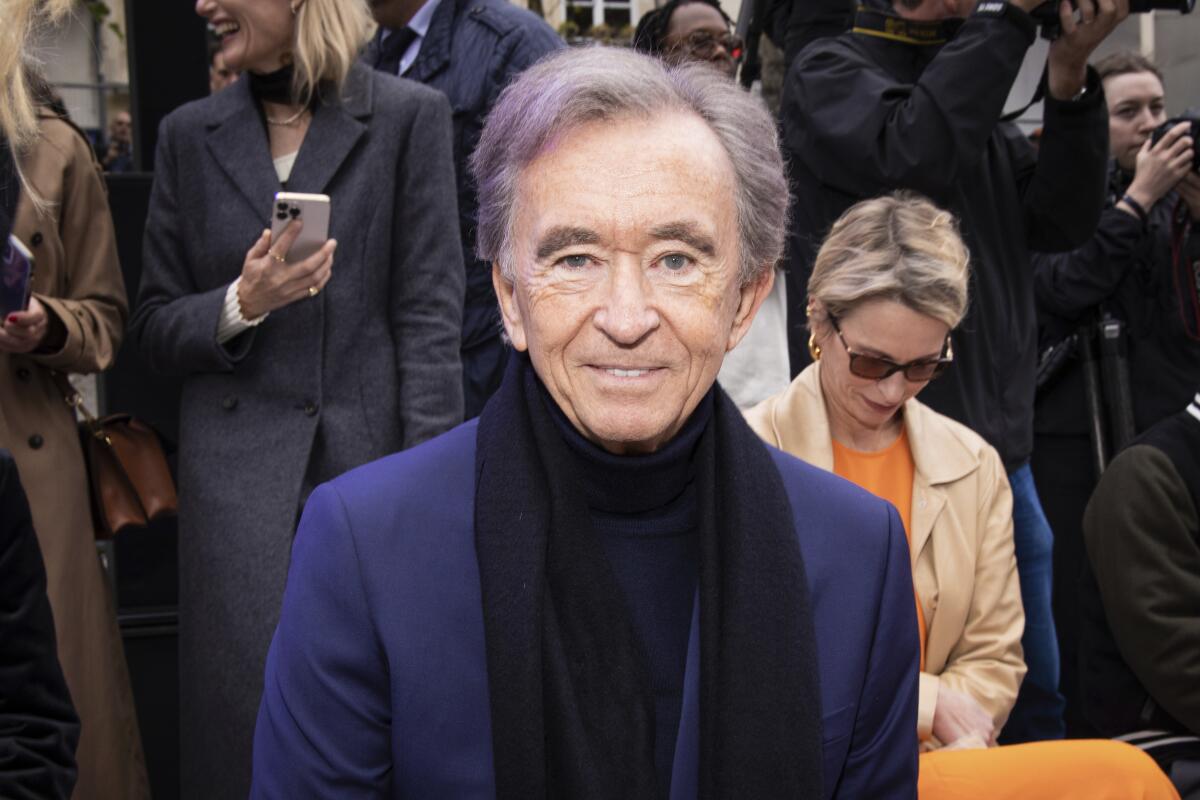
Mirisch said he voted against the project because of his critiques of the deal, along with concerns that the hotel was too large for the area.
Since then, Mirisch said, he has been appalled by the amount of money LVMH has spent on the special election campaign.
The LVMH-funded pro-hotel campaign had spent nearly $2.8 million by early May, according to campaign statements filed with the city clerk.
Among the opponents, Local 11’s political action committee spent nearly $86,000 during the same period, and Residents Against Overdevelopment — a grassroots group led by former City Council candidate Darian Bojeaux — spent a little more than $16,000.
LVMH will reimburse Beverly Hills for the cost of the special election, estimated to be about $870,000, according to the city.
Boosters see the relationship between Cheval Blanc and the street that will house it as symbiotic, with hotel guests drawn by the location doubling as an ideal client base for the neighboring luxury stores. Money will beget money, with a small fraction of every transaction going directly into city coffers.
Proponents also say that the sumptuous spectacle of Cheval Blanc would anchor the northern end of the retail corridor, guarding against the tired fate that’s befallen several other once-hot shopping districts. (LVMH’s investments on Rodeo go far beyond just the Cheval Blanc site: The conglomerate has 15 stores on the street or broader Business Triangle and owns several of those properties, according to a spokesperson.)
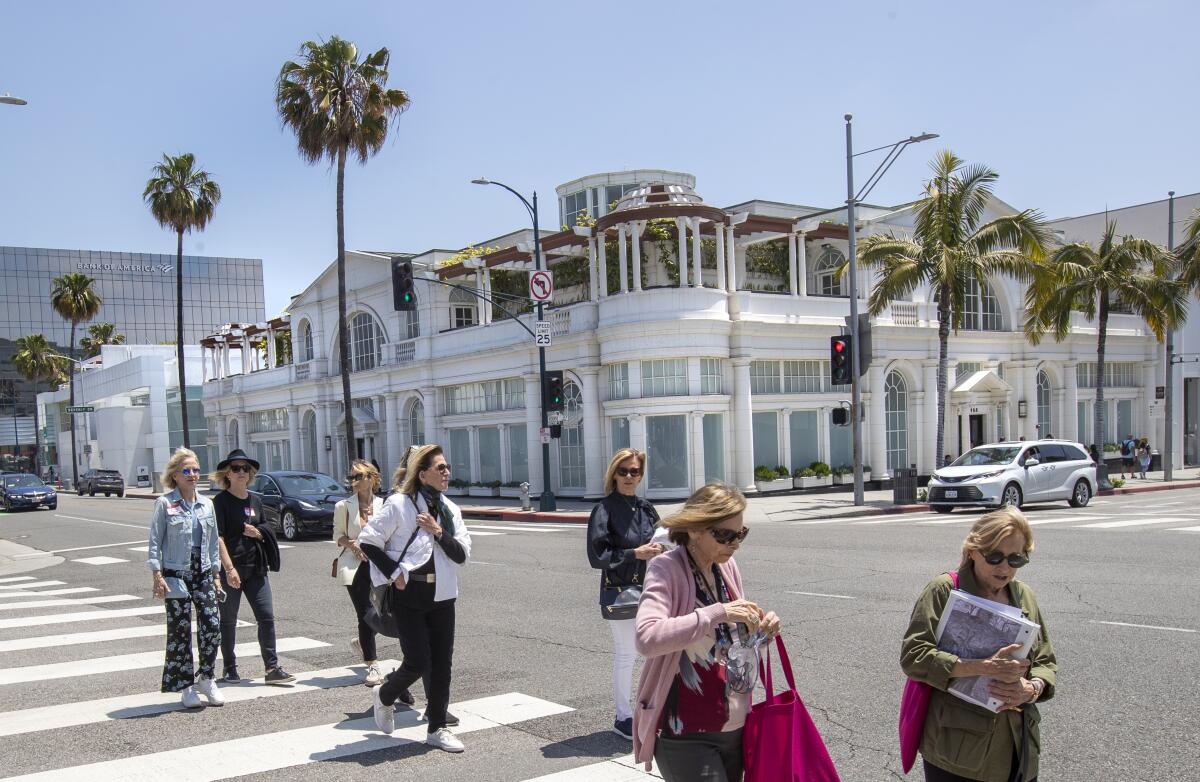
But Bojeaux, a semiretired attorney, said she fears that the size of the hotel could dramatically change her “village” for the worse.
Still, the 36-year Beverly Hills resident said she had all but given up on organizing against the Cheval Blanc when Unite Here began collecting signatures for the referendum, saying, “We probably wouldn’t have been able to do it on our own.”
“Whatever their interests were, it was really wonderful for a lot of us, because they organized the referendum petition,” Bojeaux said, characterizing the referendum election as “like something out of my dreams.”
Housing — particularly the ability to find affordable housing near workplaces — is the No. 1 issue for the union and its members, said Unite Here Local 11 Co-President Kurt Petersen.
“Beverly Hills is like the worst of the worst because there’s no affordable housing nearby,” Petersen said, adding that Local 11 has more than a thousand members who work in Beverly Hills, but very few are able to live in the city.
There are 157 deed-restricted affordable units in the city, but all but seven of those units are part of a dedicated senior housing facility, according to Deputy City Manager Keith Sterling, who said an additional 50 units are in the pipeline.
Beverly Hills voters will be asked two ballot questions: whether they approve of the zoning amendment that would allow the hotel to be constructed, and whether they approve of the development agreement.
Should either measure fail to pass, the project would be unable to move forward.
Anish Melwani, chairman and chief executive of LVMH’s North American subsidiary, said that if the voters reverse the project’s approvals, the company has no plans to bring it back before the council after already going through a rigorous, years-long process.
“We have no interest in building a hotel in a community that doesn’t want us to be there. Vox populi, vox dei, right?” Melwani said, invoking a Latin phrase that means the voice of the people is the voice of God, and saying the company would revert the properties to retail.
More to Read
Sign up for Essential California
The most important California stories and recommendations in your inbox every morning.
You may occasionally receive promotional content from the Los Angeles Times.
